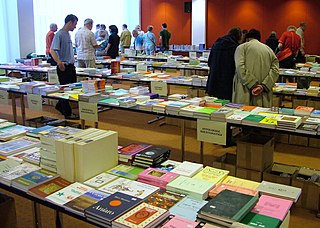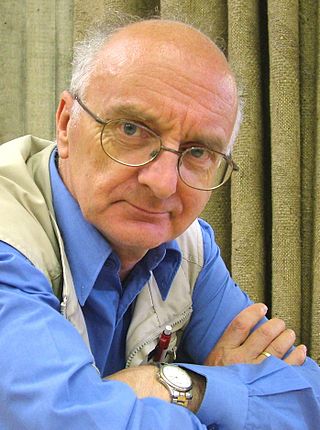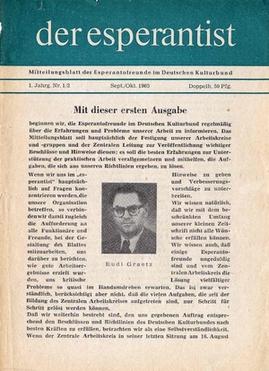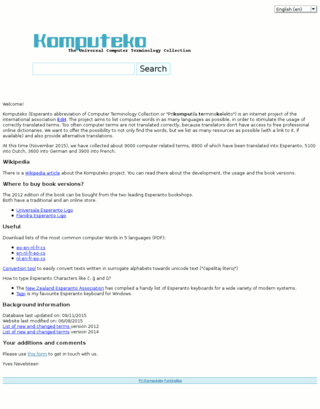
Esperanto is the world's most widely spoken constructed international auxiliary language. Created by the Warsaw-based ophthalmologist L. L. Zamenhof in 1887, it was intended to be a universal second language for international communication, or "the international language". Zamenhof first described the language in Dr. Esperanto's International Language, which he published under the pseudonym Doktoro Esperanto. Early adopters of the language liked the name Esperanto and soon used it to describe his language. The word esperanto translates into English as "one who hopes".
Esperanto culture refers to the shared cultural experience of the Esperantujo, or Esperanto-speaking community. Despite being a constructed language, Esperanto has a history dating back to the late 19th century, and shared socio-cultural norms have developed among its speakers. Some of these can be traced back to the initial ideas of the language's creator, Ludwig Zamenhof, including the theory that a global second language would foster international communication. Others have developed over time, as the language has allowed different national and linguistic cultures to blend together. Some Esperanto speakers have also researched the language's ideologies.

Literature in the Esperanto language began before the first official publication in Esperanto in 1887: the language's creator, L. L. Zamenhof, translated poetry and prose into the language as he was developing it as a test of its completeness and expressiveness, and published several translations and a short original poem as an appendix to the first book on the language, Unua Libro. Other early speakers wrote poetry, stories, and essays in the language; Henri Vallienne was the first to write novels in Esperanto. The first female Esperanto novelist was Edith Alleyne Sinnotte with her book Lilio published in 1918. Except for a handful of poems, most of the literature from Esperanto's first two decades is now regarded as of historical interest only.

Gerrit Berveling is a Dutch Esperanto author.

Tibor Sekelj, also known as Székely Tibor according to Hungarian orthography, was a Hungarian born polyglot, explorer, author, and 'citizen of the world.' In 1986 he was elected a member of the Academy of Esperanto and an honorary member of the World Esperanto Association. Among his novels, travel books and essays, his novella Kumeŭaŭa, la filo de la ĝangalo, a children's book about the life of Brazilian Indians, was translated into seventeen languages, and in 1987 it was voted best Children's book in Japan. In 2011 the European Esperanto Union declared 2012 "The Year of Tibor Sekelj" to honor the 100th anniversary of his birth.
Norvega Esperantista Ligo was founded in 1911. As the Norwegian arm of the Esperanto movement, its aim is to spread knowledge and use of the international language Esperanto. The league has a modest size of a couple of hundred members, and work done within NEL is mostly voluntary. The youth wing of NEL is Norvega Junularo Esperantista.
The Baháʼí Esperanto League (BEL) is the official organization of Baháʼís who are Esperantists. It was founded on 19 March 1973 with the approval of the Universal House of Justice.
Rüdiger Eichholz, was a Canadian physicist and Esperantist and a member of the Esperanto Academy. He is best known for publishing the "Esperanto picture dictionary" (1988) and a massive anthology co-edited with his wife, Esperanto in the Modern World (1982).
Montagu Christie Butler was a British academic, librarian, lexicographer, musician, and Esperantist. A winner of several prizes at the Royal Academy of Music in London, he was a harpist and a versatile music teacher skilled in playing various musical instruments, as well as a teacher of voice and of musical composition.
Adolf Holzhaus was an Esperantist and historian of the Esperanto movement. Between 1959 and 1985, he compiled biographies of the lives of Esperanto creator L. L. Zamenhof and his family, Esperanto pioneer Wilhelm Heinrich Trompeter, and others. He edited and published documents on the history of Esperanto, including Zamenhof's Hillelism and "Provo de gramatiko de novjuda lingvo kaj alvoko al la juda intelektularo".

Michel Duc Goninaz was a French Esperantist known worldwide for his 2002 revision of La Plena Ilustrita Vortaro de Esperanto.

Anna Löwenstein is a British Esperantist. She worked for the World Esperanto Association 1977–1981. Under the name Anna Brennan she founded and was editor of the feminist magazine Sekso kaj Egaleco 1979–1988, and she edited the 'easy language' section of Kontakto 1983–1986. She has written some non-fiction, and two novels. Her historical novel The Stone City, was first published in English and Esperanto in 1999, and has since been translated into French (2010) and Hungarian (2014). Her second novel Morto de artisto (2008) was published in Esperanto. She is well known as a journalist, teacher and activist in the Esperanto movement, and has been a member of the Academy of Esperanto since 2001.

Der Esperantist was, from 1965 to 1990, the official newsletter of the East German Esperanto movement.

The World Esperantist Vegetarian Association is a voluntary association of Esperanto-speaking vegetarians. Founded in 1908, the group's working language is Esperanto, and it is the oldest international organization of vegetarians that is currently active. TEVA published a journal, Vegetarano ("Vegetarian") from 1914 to 1932, revived in 2009 as Esperantista Vegetarano, and has also operated a spirited Internet mailing list through Yahoo! Groups since 2005.

Komputeko is an online project of the non-profit youth organization E@I (“Education@Internet”) with the goal of bringing together parallel computer terminology from various dictionaries in order to facilitate access to and comparison between different translations and thus promote exact use of language and counteract the usage of linguistic borrowings from American English. Komputeko is short for the Esperanto noun phrase "Prikomputila terminokolekto", meaning "collection of computer terms". The dictionary is written in five languages, and there are plans to expand it into other languages. A preliminary version with a few other languages already exists.

Andreo Cseh was a Hungarian/Dutch Roman Catholic priest and Esperantist known for inventing the Cseh method of Esperanto instruction.

La Esperantisto, stylised as La Esperantisto., was the first Esperanto periodical, published from 1889 to 1895. L. L. Zamenhof started it in order to provide reading material for the then-nascent Esperanto community.

The following outline is provided as an overview of and topical guide to Esperanto:











